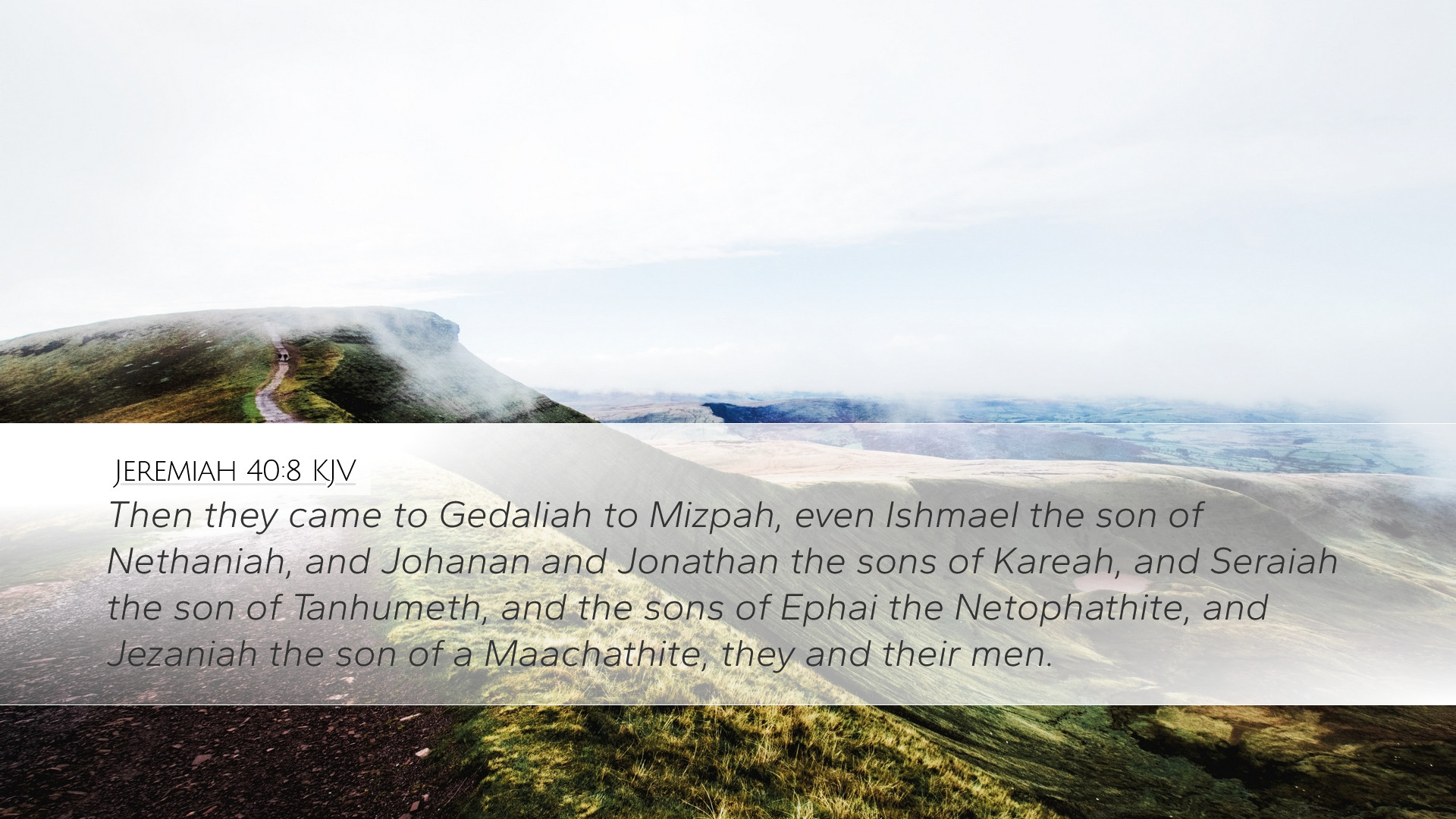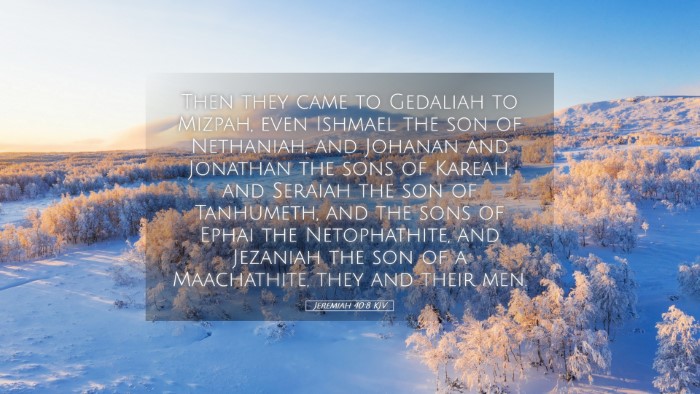Commentary on Jeremiah 40:8
Bible Verse: “Then they came to Gedaliah at Mizpah, even Ishmael the son of Nethaniah, and Johanan the son of Careah, and Seraiah the son of Tanhumeth, and the sons of Ephai the Netophathite, and Jezaniah the son of the Maachathite, they and their men.” (Jeremiah 40:8, KJV)
Contextual Analysis
This verse falls within a crucial historical context as it describes the aftermath of Jerusalem's fall to the Babylonians. Gedaliah, appointed governor over the remnant of Judah, represents a brief moment of hope and stability following devastation. The gathering of individuals to Gedaliah is significant, demonstrating their response to the changing political and social landscape.
Historical Background
Following the destruction of Jerusalem in 586 BCE, many people were left confused and vulnerable. Jeremiah had prophesied this destruction, and upon its occurrence, the Babylonian king Nebuchadnezzar appointed Gedaliah to govern the remaining populace in Judah. This verse highlights the various figures who were drawn to Gedaliah's leadership, indicating their desire for guidance amidst uncertainty.
Commentary Insights
Matthew Henry
Matthew Henry provides a profound exploration of the significance of the characters mentioned in this verse. He points out that these individuals came with their own backgrounds and motives, showcasing the diverse spectrum of society that remained in Judah. Henry underscores Gedaliah’s role as a fragile but crucial leader in a time of national crisis.
- Ishmael son of Nethaniah: Indicates possible dissent and treachery, as Ishmael later becomes a significant figure in a plot against Gedaliah.
- Johanan son of Careah: A military leader who later seeks to protect the remnant but also reflects an instinctive response to threats against their survival.
- Seraiah son of Tanhumeth: His presence signals the involvement of multiple factions and interests during this tumultuous time.
- Others mentioned: The diverse backgrounds emphasize the communal nature of Jewish identity, even amidst ruins.
Albert Barnes
Albert Barnes brings a scholarly perspective, emphasizing the implications of leadership in this passage. He notes that Gedaliah was a man of God’s appointment, and his authority was divinely sanctioned, even if it was under dire circumstances. Barnes discusses the dynamics of leadership during crisis, insinuating that Gedaliah's authority was destabilized by external threats, notably from dissenters like Ishmael.
Adam Clarke
Adam Clarke elaborates on the political and social repercussions of the events surrounding Gedaliah's appointment. He provides a practical application of the themes present in Jeremiah 40:8, remarking on the varied responses of people to leadership in times of disarray. Clarke highlights that the coming together of different individuals at this time signifies a collective need for direction and unity amidst fragmentation.
Theological Themes
- The Nature of Leadership: The passage prompts reflection on God’s sovereignty in leadership, even when the leadership itself may seem hapless or doomed.
- Unity Among Diversity: The varied backgrounds of the men who approached Gedaliah suggest that in times of crisis, people are drawn together despite their differences.
- Hope and Despair: The remnant’s desire to gather is an expression of hope amidst despair, suggesting that even in brokenness, there is a glimmer of divine purpose.
Contemporary Application
In modern contexts, this verse resonates with themes of leadership, community, and resilience. Pastors and theologians can discern important lessons about guiding communities through crises, emphasizing the need for strong, ethical, and God-centered leadership.
Additionally, the diverse identities within the gathered individuals challenge today’s churches and organizations to embrace inclusivity, showing that God’s work often transcends human divisions. Understanding the complexities and motivations within groups can foster better relationships and greater unity in the faith community.
Conclusion
Jeremiah 40:8 serves as a poignant reminder of the fragility of leadership and community in times of upheaval. By drawing insights from historical, theological, and practical applications, scholars and students can gain a richer understanding of this critical moment in Israel’s history. The figures in this passage represent not only the struggles of their time but also the enduring human quest for leadership and renewal amid chaos.


